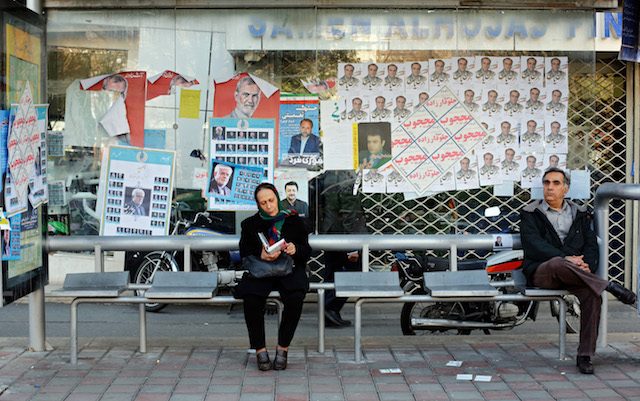SUMMARY
This is AI generated summarization, which may have errors. For context, always refer to the full article.

TEHRAN, Iran (4th UPDATE) – Long lines formed and voting was extended Friday, February 26, as Iranians cast ballots in an election test for President Hassan Rouhani, a moderate who hopes to curb conservative dominance after a nuclear deal with world powers.
The Islamic republic’s ultimate authority, supreme leader Ayatollah Ali Khamenei, was among the first to vote and he urged the country’s 55 million-strong electorate to follow suit, as “it’s both a duty and a right”.
As well as picking 290 members of parliament, voters are also selecting the Assembly of Experts, a powerful committee of 88 clerics that monitors Khamenei’s work and may choose his successor.
There were big queues at polling stations in Tehran and state television showed similar scenes in other cities, with officials speaking of high turnout, which is likely to benefit reformers.
Polls opened at 8:00 am (0430 GMT) and with many still waiting in line when they were supposed to close at 6:00 pm, the interior ministry said voters would be given an extra two hours.
Some said they would wait as long as it takes. “It’s worth it,” said Zahra Jamshidi, a 23-year-old student voting in east Tehran, who had been standing in line for 40 minutes.
Turnout in parliamentary elections four years ago was 64% nationwide and 48% in Tehran, and Rouhani has urged voters to flock to the ballot box this time.
Higher participation would help Rouhani and his reformist allies, after many moderate voters stayed away in 2012 in protest at the disputed re-election three years earlier of hardline president Mahmoud Ahmadinejad.
This year’s polls are especially important as they come just one month after sanctions were lifted under the nuclear accord, so the outcome will be seen as a de-facto referendum on Rouhani’s administration.
Known as the “diplomat sheikh” on account of his clerical credentials and willingness to negotiate, Rouhani was the driving force behind the nuclear deal, which he delivered despite political pressure at home.
‘The List of Hope’
The agreement raised hopes in Iran but the economy remains in the doldrums after a decade of sanctions that prompted a deep recession followed by high inflation.
A pro-government coalition of moderate and reformist candidates called “The List of Hope” is representing the president’s ambitions in the polls.
Lawmakers are elected for four years but the assembly has eight-year terms. Should Khamenei, who is 76, die during that time its members would pick his replacement.
Khamenei smiled warmly as he presented his identity documents to electoral officials before receiving his ballot paper which he posted in a sealed box at 8:09 am.
“Everyone must vote, those who love Iran, those who like the Islamic Republic, those who love the grandeur and glory of Iran,” said Khamenei, who backed Rouhani’s nuclear talks but has continued to rail against US influence.
If voters support the pro-Rouhani list the president could swing the balance of power among MPs and potentially pass legislation on economic, social and political matters on which he has so far been blocked.
After voting in Tehran, the 67-year-old president pledged to protect the integrity of the elections as “a mark of trust”.
Results will take days
Many young Iranians – 60% of Iran’s 79 million population are aged under 30 – posted selfies on social media as they waited to vote.
“We need to open the doors of our country to the world,” said Atefeh Jaberi, a 45-year-old writer, outside Hosseiniye Ershad, a religious institute in north Tehran, who was backing Rouhani’s allies.
“We need fundamental reforms, we need to support the government,” she said.
The run-up to polling day was largely overshadowed by controversies over who was allowed to run.
Thousands of candidates were excluded and reformists said they were worst hit, with the barring of their most prominent faces leaving them with untested hopefuls.
A total of 4,844 candidates, about 10% of whom are women, are standing in the parliamentary election. Only 159 clerics – a fifth of the applicants – are seeking a place on the Assembly of Experts.
The pro-Rouhani list is headed by Mohammad Reza Aref, a former vice president in the 1997-2005 two-term government of reformist president Mohammad Khatami.
“If we win, the path becomes much smoother,” Aref told AFP, saying a similar result as Rouhani’s victory of 2013 – in which he won in a first round with 51% of the vote – could usher in prosperity.
“Hopefully once we win a majority our first step will be an economic boom,” he said.
The main conservative faction in the parliamentary polls is headed by Gholam-Ali Hadad Adel, a former parliament speaker who said he was “optimistic” about the polls.
“I’m sure the Iranian nation… with their well-known insight, will continue the path of the Imam and the leadership,” he said, in a nod to the Islamic republic’s founder Ayatollah Ruhollah Khomeini, and his successor, Khamenei.
Results from outside Tehran were expected within 24 hours but the vote tally in the capital, which has a population of 12 million and is electing 30 lawmakers, will take three days. – Arthur Macmillan, AFP/Rappler.com
Add a comment
How does this make you feel?
There are no comments yet. Add your comment to start the conversation.